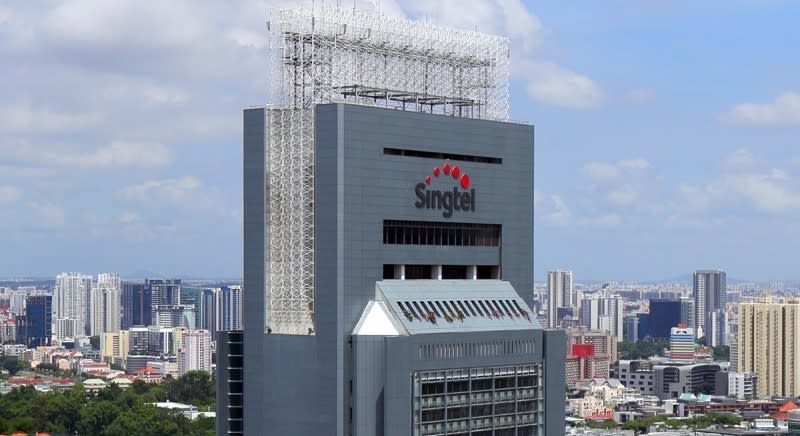Singtel reports 3QFY2023 net profit of $532 mil, down 27.6% y-o-y

The y-o-y decline was due to a net exceptional gain in the 3QFY2022.
Singapore Telecommunications (Singtel) Z74 has reported a net profit of $532 million for the 3QFY2023 ended Dec 31, 2022, 27.6% lower than the net profit of $734 million in the same period the year before.
The y-o-y decline was due to a net exceptional gain from the partial divestment of Indara, which was formerly known as Australia Tower Network (ATN).
Underlying net profit for the 3QFY2023 grew by 18.2% y-o-y to $559 million mainly due to Airtel’s strong growth momentum, according to Singtel in its business update.
Operating revenue fell by 5.1% y-o-y to $3.71 billion due to the absence of contributions from Amobee and the 8% decline in the Australian dollar (AUD). Amobee was classified as a “subsidiary held for sale” as at March 31, 2022 and ceased to be consolidated on a line-by-line basis from April 1, 2022. The sale was completed in September 2022.
Ebitda for the quarter fell by 8.0% y-o-y to $911 million for the same reasons.
Underlying operating revenue rose by 1.6% y-o-y to $3.71 billion led by higher revenue from NCS and a rebound in roaming across Singapore and Australia. On a constant currency basis, underlying operating revenue would have been up by 6.0% y-o-y.
Underlying ebitda fell by 7.3% y-o-y to $911 million, which excluded Optus’ NBN migration revenue and Amobee’s results. On a constant currency basis, underlying operating ebitda would have been down by 3.2% y-o-y.
“It was a challenging quarter but we had distinct positives in the form of the strong roaming recovery across our core consumer and enterprise businesses; a return to customer net adds over the last two months as Optus regained customer trust and confidence after last year’s cyber attack; while our Airtel associate continued to show strong growth momentum,” says Singtel’s group CEO Yuen Kuan Moon.
During the quarter, Optus’ operating revenue fell by 3.8% y-o-y to $1.91 billion despite growth in its mobile and fixed businesses. On a constant currency basis, Optus’ operating revenue rose by 4.4% y-o-y. Mobile service revenue grew 4.5%, lifted by post-paid mobile revenue from the recovery in international travel. The higher revenue was also lifted by the price increases implemented earlier in 2023. This was offset by the elevated percentage of customers who stopped purchasing Optus’ products in the period immediately following the cyberattack, which improved “significantly later” during the quarter. Mobile equipment sales were up on increased sales of high-end devices.
Optus’ ebitda for the quarter declined by 15.1% y-o-y or 7.9% y-o-y on a constant currency basis due to one-off credits in the 3QFY2022. Operating expenses rose due to higher staff levels in frontline and targeted investments in new businesses.
Operating revenue for the Singapore consumer business rose by 3.0% y-o-y to $497 million due to increased mobile service revenue which was partially offset by lower pay TV revenue and mobile equipment sales. Ebitda for the quarter rose by 12.5% y-o-y to $175 million.
Singtel’s group enterprise operating revenue fell by 0.8% y-o-y to $645 million as higher roaming and information and communications technology (ICT) revenues were offset by lower mobile equipment sales and voice. Mobile service revenue grew by 13% y-o-y due to higher roaming revenue from the lifting of travel restrictions while the increase in ICT revenue was driven mainly by higher demand for data centre services as well as the pass-through of increased utility charges. Ebitda fell by 1.3% y-o-y to $280 million reflecting a higher mix of lower margin products.
NCS revenue saw revenue grew by 21% y-o-y to $676 million propelled by broad-based growth across key lines of business as well as contributions from the subsidiaries acquired in the past year. The business’ bookings came up to $442 million in the 3QFY2023 with a pipeline of projects in various sectors. NCS’s ebitda fell by 28.5% y-o-y to $51 million due to higher operating expenses.
Trustwave’s operating revenue fell by 54.3% y-o-y to $40 million due to the transfer of its Asia Pacific business to Singtel, NCS and Optus with effect from April 1, 2022. Ebitda loss improved 8.8% y-o-y to $32 million on “tight cost management”.
For the 9MFY2023, Singtel’s operating revenue fell by 5.1% y-o-y to $11.0 billion while ebitda fell by 4.5% y-o-y to $2.79 billion.
Net profit for the 9MFY2023 increased by 0.8% y-o-y to $1.7 billion.
“As companies accelerate their digital transformation, NCS’s order book remains strong although labour and acquisition costs continue to affect margins. However, we expect NCS’s margins to improve as the cost of scaling the business eases in the coming quarters,” says Yuen.
“We are keeping a tight rein on the group’s business costs in the current inflationary environment while balancing the need to invest in growth and innovation as we steadily execute on our strategic priorities against this uncertain economic backdrop,” he adds.
Shares in Singtel closed 5 cents lower or 2% down at $2.45 on Feb 15.
See Also:
Click here to stay updated with the Latest Business & Investment News in Singapore
Brokers' Digest: Singtel, Boustead Singapore, UMS Holdings, Wilmar International, MPACT
MPACT reports 3QFY2023 DPU of 2.42 cents, unchanged from previous year
Get in-depth insights from our expert contributors, and dive into financial and economic trends

 Yahoo Finance
Yahoo Finance 